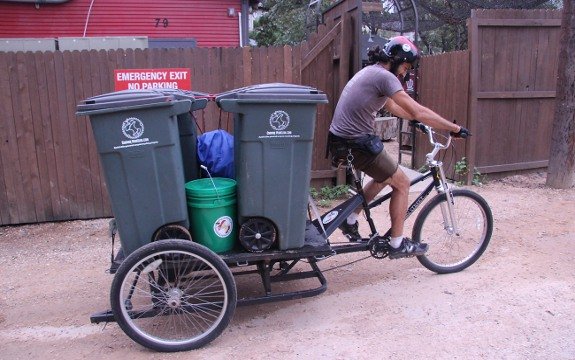Thinking Outside the Trash Can: Austin Business Diverts Food Scraps to Organic Gardens by Bicycle

 How hard do you work to do your part in preserving the environment while helping your community? One Austin company is thinking outside the trash can, diverting more than 100 tons of restaurant and residential food scraps to community gardens – by bicycle.
How hard do you work to do your part in preserving the environment while helping your community? One Austin company is thinking outside the trash can, diverting more than 100 tons of restaurant and residential food scraps to community gardens – by bicycle.
East Side Compost Pedallers diverts biodegradable waste that would otherwise end up in the landfill to local organic gardens and farmers to become nutrient-rich compost. Their business has grown by 10 percent since July.
By pedaling “scrapple” (their term for compostable food scraps) on custom-fit bikes, the riders for East Side Compost Pedallers get an amazing work-out, and help the environment, all while promoting food sustainability. It’s a win-win-win scenario.
“Yes, it’s tiring and yes, I get intimidated by the workload, but the daily cheers from passing cars and trucks who recognize the good we’re doing brings me home with my head up,” says Paul Wilson.
Residents pay only $4 a week to have their ‘scrapple’ picked up and diverted to where it can do some good. The company has only seven cyclists at the moment, but plans to grow as demand continues to increase. They may be aided by the fact that Austin, Texas, unlike many other U.S. cities, has a small compost pilot program available to residents of some neighborhoods.
“Imagine if there were no trash cans!” says Marie Horan, ESCP’s director of organic operations. “I think it’s entirely doable, especially with compost. Unlike recyclables, organics are such a valuable resource because of how easy they are to turn back into something people can use.”
Seed sovereignty and food sustainability are key issues in the GMO-tainted world, and businesses like this one turn biotech’s claim that we can’t feed our growing populations without their toxic products on its head.
Hugh Grant, Brett Begemann, Consuelo E. Madere and a handful of Monsanto directors have near total control of the world’s food supply, but not if people continue taking actions like this one. After all, small-scale, organic gardening has proven to feed the world just fine.
Worldwatch Institute also says that world hunger is best solved by small-scale agriculture, not the industrial agricultural model we’ve all been finagled into. Bye-Bye GMO. Hello organic composting (from recycled food scraps!) and non-GMO seeds.
You can watch a full video about the Austin company here.

How am I supposed to actually know that all the food scraps are ORGANIC! Thats a pretty far fetched audacious comment to say, “…that the food scraps are 100% ORGANIC…” I’m not that stupid. The Government has plans to kill as many as 6.5 Billion people. Not gonna happen but they’ll do it any way they can: FDA, FTC, FEDS, CIA, FBI, CDC, etc. etc. HA HA HA HA HA HA HA HA HA HA HA HA HA HA HA HA HA HA HA HA HA HA…Its hard to know whom to trust these days! This planet is F’kd! If you see a white light in the sky bend over and kiss you a** goodbye!
So, this non-organic and GMO full food is to become compost for “organic” food? I would not want to eat this variety of organic food.
if god struck the company with lighting and it burnt down to the ground what an accident that would be!
Wonderful? but will gmo show up in organic?
Every organic gardener knows to keep non organic food wastes out of the compost. also reported that 2 beer manufacturers have tainted gmo, so avoid the slug killing trick Miller was 1 of them
Its not labelled and becoming impossible to avoid it in any manufactured foods even our meat critters are fed btcorn feed so, shop local organic farm markets and Community Supported Agriculture(CSA) is the way to go.
Visit your organic supply outlets they have plenty of products for every gardening issue. They have experience and knowledge so don’t be shy to ask for advice.
Mulch your leaves/tree branches and put your garden to sleep inexpensively if thats available for you to do. Some town dumps do leaf and tree composting for residents to pick up.